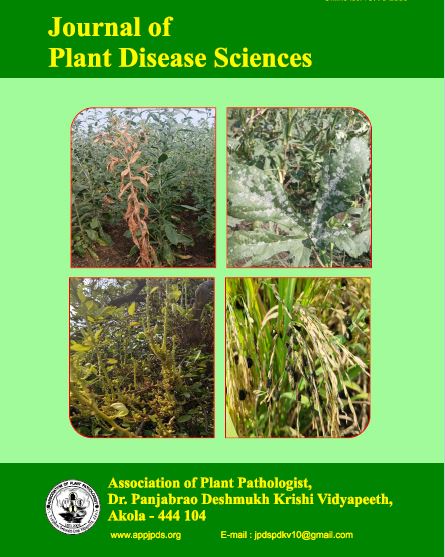Efficacy Of Plant Solvents Extracts Against Xanthomonas Axonopodis Pv. Citri Causing Citrus Canker
DOI:
https://doi.org/10.48165/jpds.2022.1709Keywords:
Citrus canker, In vitro, Plant extract, X. axonopodis pv. citriAbstract
In vitro antibacterial properties of some solvents, such as petroleum ether, chloroform, ethyl acetate, dichloromethane, distilled water, and methanol extraction of two plants, Azadirachta indica and Eucalyptus globulus, were studied against Xanthomonas axonopodis pv. citri, the primary agent of citrus canker disease. Azadirachta indica whole plant extract had the highest extraction yield (9.08%) in distilled water and the lowest (2.9%) in petroleum ether, whereas Eucalyptus globulus extract had the highest extraction yield (9.01%) in methanol and the lowest (7.01%) in ethyl acetate solvent. By agar well diffusion and paper disc method, chloroform extract of Azadirachta indica and methanol extract of Eucalyptus globulus were found to have promising antibacterial action against Xanthomonas axanopodis pv. citri. The chloroform leaf extract of Azadirachta indica showed the maximum percentage of inhibition when compared to the methanol extract of Eucalyptus globulus.
References
Autade, R.H., S. Saini, P.G Reddy, S.C Deorukhkar and G. Padmajakshi, 2015: Effect of neem extract against opportunistic bacterial and fungal pathogens associated with AIDS. Int. J. Cur. Micro. App. Sci., 4(3): 988-999.
Attaullah, R. and S.S. Khaleghi, 2014: Phytotoxic effects of Eucalyptus globulus leaf extract on Solanum nigrum. Sou. West. J. Horti. Bio. Env., 5(1): 43-53.
Babu, S.K., V.K, M. Naik, J. Latha, and K. Ramanjaneyulu, 2016: Extraction, Isolation and Phytochemical Investigation of Natural Products by Using Chromatographic (TLC) Method. Int. J. Pharm. Pharma. Res., 7(10): 380-393.
Bonjarand Farrokhi, 2004: Antibacillus activity of some medicinal plants used in traditional medicine of Iran.Niger.J. Nat. Prod. Med., 8:34-39.
Chand, J.N. and V. Pal,1982: Citrus canker in India and its management. In: Problems of Citrus Diseases in India (S.P. Raychaudhuri and Y.S. Ahlawat, Eds.). pp. 21- 26. Surabhi printers and publishers, New Delhi.
Egwaikhide, P. A., S. O. Okeniyi., E. E. Akporhonor and S. O. Emuia, 2008: Studies on bioactive metabolites constitutes and antimicrobial evaluation of leaf extracts of Eucalyptus globules. Agri J., 3(10): 42- 25.
Gupta A. K., N. K. Ahirwar., N. Shinde., M. Choudhary., Rajput Y. S., and A. Singh 2013: Phytochemical Screening and Antimicrobial Assessment of Leaves of Adhatoda vasica, Azadirachta indica and Datura stramonium. U. K. J. Pharma Biosci., 1(1): 42-47.
Mumtaz, J., K.W. Mohiuddin and K. Fehmeeda, 2011: Studies on antibacterial property of Eucalyptus the aromatic plant. Int. J. Pharma. Sci. Rev. Res., 7(2): 86-88.
Panse, V. J. and P. V. Sukhatme, 1978: Statical Methods for Agricultural Workers.3rd Edn, ICAR, New Delhi. Pp361.
Prasad M.P., 2014: Analysis of antimicrobial compounds in Cyperus rotundus and Azadirachta indica against human pathogens. Int. J. Cur. Microbic. App. Sci., 23(3): 206-210.
Raho, G.B. and M. Benali, 2012: Antibacterial activity of the essential oils from the leaves of Eucalyptus globulus against Escherichia coli and Staphylococcus aureus. Asian. Pac. J. Biomed., 2(9):739-742.
Rajapandiyan, K., S. Shanthi, A.M. Murugan, G. Alagu Muthu, and A. J. Ranjit Singh, 2011: Azadirachta indica - cow urine extract, a novel controlling agent towards Clinically significant Multi Drug Resistant Pathogens. J. App. Pharm. Sci., 1 (10): 107-113.
Rajender, B., A. Saikumar, A. Venkatesham, 2015: Comparative antibacterial activities of combined crude leaf extracts of Eucalyptus globules, Azadirachta indica and Ocimum sanctum. J. Pharm. Res., 4(4):164-166.
Rai, Y., K. Navneet, A. Deepa, K. Rajandeep and P. Hatish, 2013: Phytochemical analysis andantimicrobial activity of methanolic extract of Eucalyptus globules. J. Microbial. Biotech. Res.,3 (2): 77-82.
Rossetti, V., 1977: Citrus canker in Latin America: A review. Proc. Int. Soc. Citric. 3: 918-924.
Vinoth B., R. Manivasagaperumal and M. Rajaravindran, 2012: Phytochemical analysis and antibacterial activity of Azadirachta indica. Int. J. Res. Plant. Sci.,2(3):50-55.

